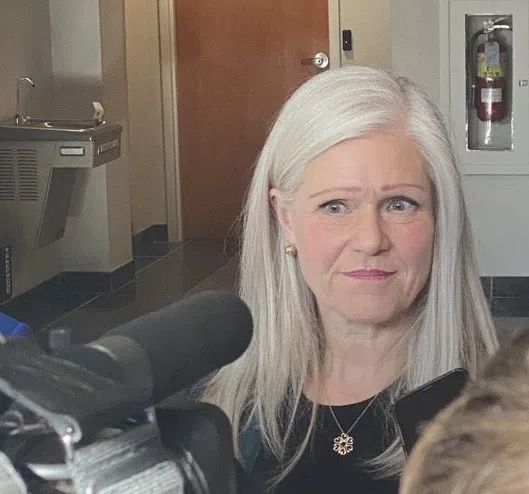Moncton is the first municipality in the province to benefit from the federal Housing Accelerator Fund.
A more than $15-million investment announced Thursday will encourage the creation of much-needed housing in the city.
Mayor Dawn Arnold says around 490 additional units will be built over three years, which puts the city on track for the construction of more than 5,500 homes over the next decade.
“We are on track to have a significant number of units built over the next three years, but there’s lots lots of room. This will immediately streamline quite a number of projects that are about to be in the works right now. There are 16 different actions to really streamline and accelerate housing in our community,” Arnold says.
The funds will help encourage the creation of more density and affordable housing in Moncton through grant programs incentivizing more missing-middle development and accessory dwelling units and assisting non-profit housing developers.
Moncton’s action plan will also help streamline development by reducing barriers to development through zoning by-law changes addressing four units as-of-right in all residential zones, design standards, parking restrictions, permitted uses and height restrictions.
“We’ve definitely, as a council, for quite a number of years now, had a real emphasis on downtown density and that will continue. We know that you cannot build a vibrant dynamic and functioning city if we continue to sprawl out. So, we have definitely had a focus on our downtown,” says Arnold.
“We will continue to have that focus on our downtown, but this money will also be used for infrastructure. There are two areas of town where some underground and roads will be put in place so that those areas can be opened up.”
New housing will include apartments, but will also allow current homeowners to branch out with things like basement units or accessory units.
“Lack of housing, in particular affordable housing, continues to be one of the most pressing challenges facing the City of Moncton. The Housing Accelerator Fund provides welcomed support that will help drive the construction of more units right now when they are desperately needed,” Arnold adds.
She says this funding will help move projects forward by removing some of the financial pressures developers and non-profit housing projects are facing.
But when asked if these funds will be enough to meet predicted demands, she responded, “Oh, it’s absolutely not enough, no, but it is a really good start to get things going.”
Arnold also stated that some of these housing units will be designated as affordable, but she couldn’t say exactly how many.
The population of Moncton has grown more than 16 per cent since 2016, and by 2046, the population is expected to be up by at least 44 per cent. It is also the fastest-growing community in the country.
“The City of Moncton had put together a really robust plan making sure that there’s going to be subsidies that are going to be provided to different builders, not-for-profit agencies, etcetera to make sure that people will have access to those affordable housing and the affordable rent that they need,” says Moncton-Riverview-Dieppe MP Ginette Petitpas Taylor.

Moncton-Riverview-Dieppe MP Ginette Petitpas Taylor. (Photo: Tara Clow)
“We have to really keep pace with the housing needs. This year, we’ll be providing a 25 per cent upfront, and from there, CMHC will be working closely with the city to make sure that they’re going to be meeting their targets.”
The Housing Accelerator Fund was launched in March and is a $4-billion initiative that will run until 2026-27.
It’s designed to help fast-track at least 100,000 new homes for people in towns, cities, and Indigenous communities across Canada.
The fund asks municipalities for innovative action plans and, once approved, provides upfront funding to ensure the timely building of new homes, as well as additional funds upon delivering results.





